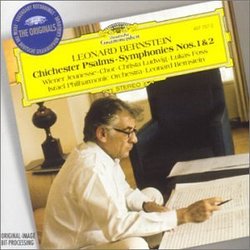Great music, Greatest CD
MusicMan | Seattle, WA | 03/31/2006
(5 out of 5 stars)
"I first heard Bernstein?s Symphony No. 1 ?Jeremiah? played in Seattle in 2005. It was an unforgettable experience. At times this music has such power that is sends Goosebumps down your arms and legs. Then there are times when the music become almost transcendental is its lyricism. The three movements are 1. Prophecy: the prophet speaks his solemn message, 2. Profanation: he is mocked by the people, and 3. Lamentation: a lament for the fallen city. The firs movement starts with a horn call which states the thematic material. From there the movement build to a earth shaking climax before fading until only the low strings remain holding a long foreboding note. The second movement is the scherzo. If this movement doesn?t make you want to move nothing will. Pulsing almost jazz like motor rhythms propel this movement to an explosive finish. Bernstein was always a great orchestrater. (At the end of the second movement he even asks the timpanist to strike the drum with a maraca!) The beautiful last move is a lamentation that uses a mezzo-soprano. The Hebrew text is from the Book of Lamentations, Chapter 1, verses 1-4; Chapter 4, verses 14-15; and Chapter 5, verses 20-21. Here is the English text:
How doth the city sit solitary, that was full of people! how is she
become as a widow! She that was great among the nations, and
princess among the provinces, how is she become tributary!
She weepeth sore in the night, and her tears are on her cheeks:
among all her lovers she hath none to comfort her: all her friends
have dealt treacherously with her, they are become her enemies.
Judah is gone into captivity because of affliction, and because
of great servitude: she dwelleth among the heathen, she findeth no
rest: all her prosecutors overtook her between the straits.
Jerusalem hath grievously sinned . . .
They have wandered as blind men in the streets, they have
polluted themselves with blood, so that men could not touch their
garments. They cried unto them, Depart ye; it is unclean; depart,
depart, touch not . . .
Wherefore doest thou forget us fore ever, and forsake us so
long time? Turn thou us unto thee, O Lord . . .
Although no CD can replicate the experience of hearing this piece live, this is the best recording available of Berstins first two symphonies. There is no excuse for not owning this CD.
"


 Track Listings (12) - Disc #1
Track Listings (12) - Disc #1